Related Research Articles
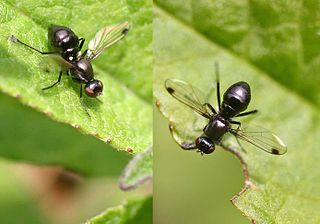
The Sepsidae are a family of flies, commonly called the black scavenger flies or ensign flies. Over 300 species are described worldwide. They are usually found around dung or decaying plant and animal material. Many species resemble ants, having a "waist" and glossy black body. Many Sepsidae have a curious wing-waving habit made more apparent by dark patches at the wing end.

Lucilia is a genus of blow flies in the family Calliphoridae. Various species in this genus are commonly known as green bottle flies.

Fannia is a very large genus of approximately 288 species of flies. The genus was originally described by the French entomologist Jean-Baptiste Robineau-Desvoidy in 1830. A number of species were formerly placed in the genus Musca.

The genus Scathophaga are small to medium sized predatory flies that for the most part, have larvae that feed on other insect larva within animal dung or decaying vegetable matter. Many are highly variable, sometimes producing small, infertile males that superficially resemble females. This species is an example of an organism which may selectively store the sperm of multiple males, as females have three to four spermathecae.
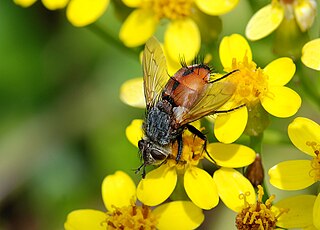
Tachina is a genus of large flies in the family Tachinidae. There are approximately 600 species worldwide. Most have larvae that are parasitoids of Lepidopteran caterpillars.
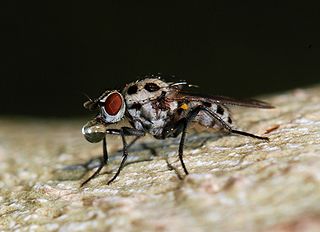
Anthomyia is a genus of flies in the family Anthomyiidae. They look rather like small houseflies, but commonly have conspicuous black-and-white patterning. This appears to be a mild form of aposematic coloration, though they do not appear to be distasteful unless they have eaten something offensive to the predator and have loaded their guts with it.

Suillia is a genus of flies in the family Heleomyzidae. There are at least 130 described species in Suillia.

Sepsis is a genus of flies in the family Sepsidae.
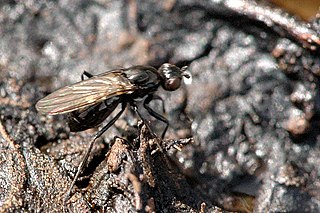
Themira is a genus of flies in the family Sepsidae.

Saltella is a genus of flies in the family Sepsidae.

Chamaemyia is a genus of flies in the family Chamaemyiidae. It is the type genus of its family.

Allopiophila is a genus of small flies in the family Piophilidae.

Limosina is a genus of flies belonging to the family Lesser Dung flies.
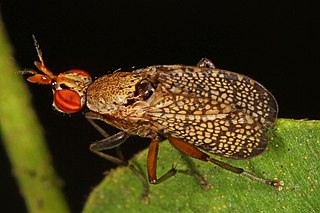
Tetanocerini is a tribe of flies in the family Sciomyzidae. There are more than 400 described species in the tribe.

Tetanocera is a genus of marsh flies, insects in the family Sciomyzidae. There are at least 50 described species in Tetanocera.

Cordilura is a genus of dung flies in the family Scathophagidae. There are more than 90 described species in Cordilura.

Sciomyzinae is a subfamily of flies in the family Sciomyzidae.
References
- ↑ Pont, A.C. (1979). Sepsidae. Diptera (Handbooks for the Identification of British Insects 10/5c). London: Royal Entomological Society of London. pp. 35 pp.
- ↑ Pont, A.C.; Meier, R. (2002). The Sepsidae (Diptera) of Europe (Fauna Entomologica Scandinavica 37). Brill. pp. 198 pp.